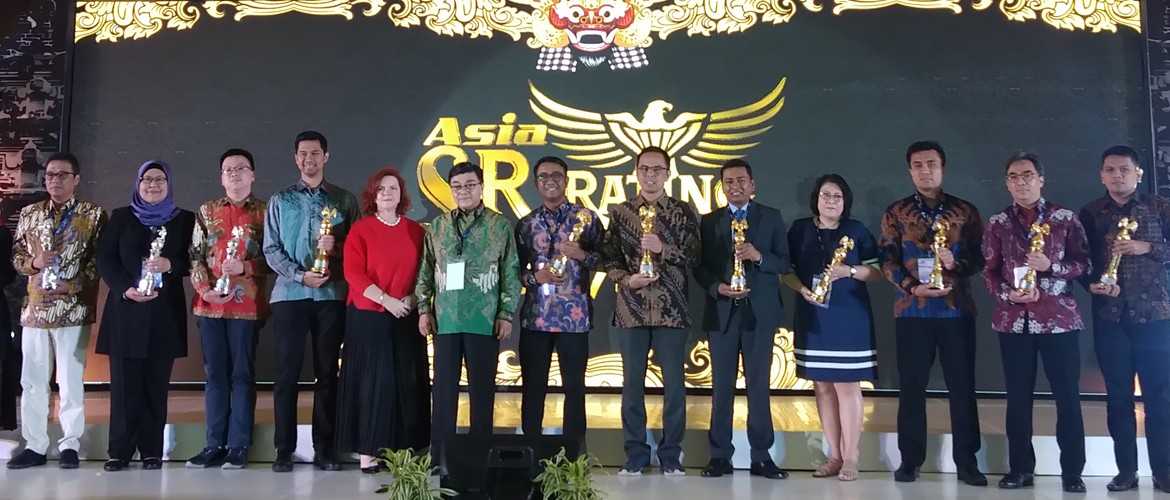23 Nov 2019
Back to List
November 23, 2019
BALI - Angkasa Pura Airports has won the Gold Rating in the 2019 Asia Sustainability Reporting Rating (ASRRAT) organized by the National Center for Sustainability Reporting (NCSR). The award was handed over by Global Reporting Initiative (GRI) ASEAN Hub Regional Head Michele Lemmens to the Stakeholder Relations and Angkasa Pura Airports BOD Senior Secretary Gede Eka Sandi Asmadi and witnessed by Research, Technology and Higher Education Minister Bambang Brodjonegoro in Nusa Dua, Bali on Saturday (10/23).
"This Gold Rating achievement is an appreciation of Angkasa Pura Airports' commitment in running a sustainable airport business and always contributing positively to environmental preservation, providing social and economic impacts for the community as referred to the Global Reporting Initiative (GRI) standard while supporting the Sustainable Development Goals (SDGs) which have been set by the United Nations and agreed upon by the Government of Indonesia," said Angkasa Pura Airports president director Faik Fahmi.
"In supporting Sustainable Development, there are three important aspects that must be considered by the company, namely Profit, People and Planet. Profit means making big profits without relying solely on business as usual through efficiency measures but must also do innovation and keep innovating. People means companies must continue investing to improve their human resource competencies. Planet means a company must contribute positively to the environment. For that reason, I strongly support companies to continue to innovate in supporting Sustainable Development Goals," Bambang said.
Angkasa Pura Airports' commitment to environmental sustainability and sustainable business processes is not only demonstrated through various activities that support environmental preservation in the airport area such as conservation and environmental education. More than that, Angkasa Pura Airports applies the principles of environmental preservation to its business processes in order to realize sustainable business processes.
"Airport development and management by Angkasa Pura Airports must bring social and environmental benefits to the community around the airport. Therefore, to anticipate the long-term environmental impact, we are committed to applying the principles of eco-airport and sustainable companies in the operation and development of Angkasa Pura Airports airports,” Faik said.
Angkasa Pura Airports has introduced the concept of an eco-friendly airport through the new terminal of General Ahmad Yani International Airport in Semarang, which followed by the full implementation of ISO 14001 standards related to the environment by I Gusti Ngurah Rai International Airport in Bali. Angkasa Pura Airports has also included environmental strategies into corporate social responsibility (CSR) programs such as planting trees, coral reefs, and others.
Some environmental-based operational initiatives executed by Angkasa Pura Airports are as follow:
ASSRAT was initiated by the National Center for Sustainability Reporting (NCSR), an institution in Indonesia affiliated with the Global Reporting Initiative (GRI) organization based in the Netherlands.
"ASSRAT provides four types of ratings, namely Platinum (highest), Gold, Silver and Bronze (lowest) to the best companies that have successfully delivering sustainability performance to stakeholders through sustainability reports," said NCSR chairman Ali Darwin.
This year, the report assessment process was carried out by 50 assessors, who are lecturers from various universities in Indonesia and have a specialist certificate of ongoing reports issued by NCSR. The number of ASRRAT participants are 50 companies consisting of 41 Indonesian organizations/companies, two Bangladesh companies, three Malaysian companies, two Singaporean companies and two Philippines companies.
"The result of the rating can be used by other agencies such as the Ministry of Environment and Forestry to assess the reliability of the environmental aspects of a company. For the Bank, this rating is able to assess to what extent environmental and social risks of a company must be taken into account in granting credit," Ali said.
Up
